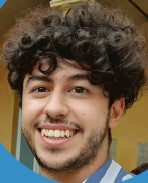A good memory.
Conversation with… Tiziano Olgiati.

“I think that investing the elements in common with one’s mother tongue, or with the languages you already know, promotes the learning of a foreign language, to have a basis on which to fasten the memory of what you learn.”
Tiziano Olgiati graduated in 2019 in ‘Mathematics’ at the ‘Università degli Studi’ of Milan, then in 2021 also in ‘Linguistics’ at the University of Pavia (Italy).
Today he is 27 years old and teaches ‘Mathematics and Physics’ high school : between 2019 and 2022 he worked as an academic tutor at the University of Pavia for the Courses of ‘General Linguistics’ and ‘Glottology’, within the graduate courses of both ‘Literature’ and ‘Foreign Languages and Cultures’. He is fond of teaching to the point that he enrolled, again at the University of Pavia, in the Master’s degree of ‘Mathematics’ in order to be able to enter the Competition for tenured teachers.
“I often go to work with a smile : teaching students allows me to revisit subjects I love, mathematics precisely, and students really involve themselves, I receive their stories and I recognize myself as part of their lives.”
‘Which part did memory play in your professional biography ?’
“Since I was a child I collected foreign languages in my head, and the respective dictionaries on my desk : I’m drawn by how each language expresses the same concept in a different way, and by how every language very well succeeds in this aim, according to its own and often unique strategies. Auditory memory helped me in the languages learning process and, as a consequence, in the writing language process, or in that of translating when it comes to an ancient language.”
‘So do you also appreciate ancient languages ?’
“Among the ancient languages, considered as languages no longer spoken, I had the opportunity to study, in addition to Latin, also ancient Greek and classical Armenian : these last two infact, not being subjects of study in high school, I studied in depth, following extracurricular courses. Latin remains perhaps the ancient language I appreciated the most, it is concise : each sentence has the right number of words, not one more nor one less, allows you to get straight to the point, but also to express complex reasoning in perfectly pigeonholed sentences one after the other, as in ancient Cicerone’ masterful speeches…”
‘Is there a relationship, in your opinion, between auditory memory, and writing as graphic memory?’
“When I was a student in high school, I wanted to get better at translating Seneca : the teacher proposed me a sentence with a particularly difficult construction, then she suggested I repeat it out loud, several times. I realized that repeating a sentence, with awareness of the meaning of each word, allowed me to memorize the grammatical construction : then I also realized I could recognize the same pattern in other different sentences too, and I must say that, as well as objectively improving in translations, since that day I apply the method every time I find myself studying a difficult grammatical element in a new language, and it has always worked.
I think that one of the reasons that hinder learning a language is the attempt to translate word for word what is said in one’s native language, but there is rarely a one-to-one correspondence between sentences, in different languages : instead, it is better to try to understand how those sentences are structured, or perhaps the words themselves in a certain language, and then try to use them, combining them together.”
‘Using one’s memory, in short, a bit like a laboratory ? Was this how your passion for mathematics was born ?’
“I was always attracted by numbers and by the concepts that arise from them, I wanted to discover more and more. A teacher of mine in the two-year period of high school said : ‘Mathematics is made of bricks. Each concept leads to another that builds on the previous one.’ Well, I like mathematics because develops coherently, and can expand continuously as new theorems are discovered.”
‘Then you discovered that Linguistics exists, even as an university subject…’
“Yes, it is a bit difficult to explain… We all encounter mathematics since elementary school, but the same cannot be said for Linguistics which is an university subject for both the Faculties of ‘Literature’ and ‘Foreign Languages’ : ‘linguistics’ generally means ‘the scientific study of language’, and I have some familiarity with languages. I always like to discover how languages come to express concepts, and then also what are the peculiarities of the cultures that use them. Shortly before my scientific high school exam I discovered that Linguistics existed, as a general science which allows us to abstract the properties of languages and to understand its role in society : I realized that it was exactly what I liked.”
‘In your opinion a good memory is a defense for children, and why ?’
“Certainly a good memory allows a child to have better defense mechanisms. Learning from your mistakes allows you to know the consequences of your actions, and to adjust your behaviour accordingly when you find yourself in situations similar to past experiences. Remembering experiences, or events including historical ones, and different situations, allows you to act consciously. Plus, having memory of what you have learned gives you a possibility : the one of having access to one’s own knowledge, to be able to face situations with new solutions, and therefore further learn, and progress.”
At care of Marina Bilotta Membretti / Cernusco sul Naviglio – April 4, 2024